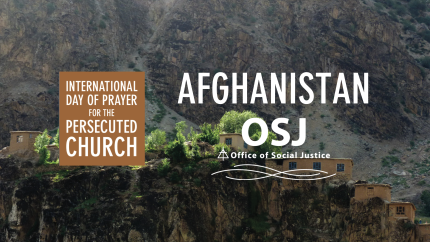
Sign up to receive justice news, periodic Action Alerts, and/or updates from the Do Justice blog.
Our work on religious persecution arises out of the Committee to Study Religious Persecution and Liberty. Here you will read a synopsis of their findings. The full report is linked at the bottom.
“The definition [of religious liberty] has two elements: (1) ‘the capacity to manifest fully, in public and private, one’s religion without interference from the state’; and (2) ‘the obligation of the state to protect citizens from anyone who might threaten the expression of those citizens’ faith.’
What do these convictions mean in practice? Muslims, Jews, atheists, agnostics: we all bear the image of God. This is the most fundamental theological reason why Catholics, Protestants, and other Christians have joined together to defend religious freedom. We are not indifferent to the truth and to the worship of the true God, but we know that any coercion in faith, any repression or violence, violates the image of that same God. Those in the Reformed Protestant tradition of Christianity add that any coercion is also a denial of the sovereignty of God and that salvation in Jesus Christ can only be received as a gift.”(Committee to Study Religious Persecution and Liberty, p. 15)
The definition of persecution is simply “the unwarranted violation of religious liberty.” If religious liberty protects the faithful from threats to their religious expression, then religious persecution occurs when those threats become a reality and the state fails to prevent these violations or even perpetrates them. (Committee to Study Religious Persecution and Liberty, p. 16)
“We call the denomination and its churches to refocus on this problem. To build a movement against persecution, the most fundamental thing the church must do is preach and practice a theology that religious freedom is for all persons. Practicing that theology entails being willing to work across lines of difference to develop political and social virtues while allowing freedom to disagree on reasons for doing so.” (Committee to Study Religious Persecution and Liberty, p. 23)
“Practically, liturgical acts can help reorient the church to preaching a gospel that rejects persecution in favor of shalom….We do not envision prayer as a brief stopping point before more important matters. We emphasize prayer—more specifically, prayer as part of public worship—precisely because it is a key starting point in building a faith-based movement against persecution.” (Committee to Study Religious Persecution and Liberty, p. 23-24)
There is a growing epidemic of persecution of religious minorities around the world. These religious minorities are often also ethnic minorities who suffer economic and social isolation as well.
These are just some of the situations in which religious minorities are suffering under restrictions to their religious freedom across the world. Almost ¾ of the world’s population lives in countries where there is some restriction on religious freedom, either from the government or from non-state groups such as the Islamic State. Unfortunately, it is often religious leaders who are inciting violence against religious minorities.
When conflicts are simplified into Muslim vs. Christian, Hindu vs. Muslim, etc, other economic and political dynamics that are fuelling conflict are often masked. This over-simplification is problematic because any curtailing of the right to religious freedom is a serious issue. We need to fully understand the roots of these conflicts in order to help.
“Continue to remember those in prison as if you were together with them in prison, and those who are mistreated as if you yourselves were suffering.” (Hebrews 13:3)
The freedom to worship and serve God is a God-given human right. It is also a right guaranteed by the constitutions of many countries - including Canada and the U.S. It is stated clearly in article 18 of the Universal Declaration of Human Rights:
Article 18 Everyone has the right to freedom of thought, conscience and religion; this right includes freedom to change his religion or belief, and freedom, either alone or in community with others and in public or private, to manifest his religion or belief in teaching, practice, worship and observance.
A distinction should be made between countries like Canada and the U.S., where Christians are not in the minority and in fact have a great deal of power. While many Christians there are concerned about protecting religious freedom, this is markedly different from the situations of persecution faced by people around the world who are religious minorities, who have little political power or protection, and whose religious designation makes them vulnerable to harm.
“Everyone will sit under their own vine and under their own fig tree, and no one will make them afraid, for the Lord Almighty has spoken. All the nations may walk in the name of their gods, but we will walk in the name of the Lord our God for ever and ever.” (Micah 4:4-5)
Through the prophet Micah, God paints a picture of people flourishing in their own lands, free from fear. We know that God is at work in His world to restore it, and we see signs of hope in…
Restoration begins with resistance:
Shoulder to Shoulder is a campaign that links Christians and Muslims in the United States in an effort to combat anti-Muslim bigotry. Visit their website to learn more and sign their pledge!
Evangelicals for Peace (EfP) is a group of organizations that represent diverse range of evangelical approaches to force and non-violence. For the EfP, peace is framed through the Hebrew word, Shalom, implying wholeness and full human flourishing. They seek to advance solutions to violent conflict, encourage foreign and security policies that advance justice and peace, and work for the reconciliation of global enemies.
Public Faith is a bi-partisan organization that advocates for a Christian and civil engagement in the political sphere. While they address many issues, one of their larger issues is religious freedom. Visit Public Faith’s website to learn more!
The Institutional Religious Freedom Alliance with the Center for Public Justice promotes government policies, public attitudes and organizational best-practices that safeguard institutional religious freedom so that faith based organizations can make their vital and uncommon contributions to the common good.
The Pew Research Center is a nonpartisan American "fact tank" based in Washington, D.C. It provides information on social issues, public opinion, and demographic trends shaping the United States and the world. In addition, it provides research and information on religion--particularly restrictions on religion, and religion and society. Visit their website here.
The mission of the Henry Institute is to “promote serious reflection on the interplay between Christianity and public life.” They do this by promoting scholarship on the connection between Christianity and politics, targeting the learning of students, and engaging the church and broader community.
